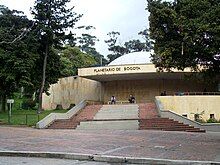Colombia lunar sample displays
| Regolith rock | |
 Apollo 11 and 17 Sample Lunar Displays in permanent display at the Bogotá Planetarium, Colombia | |
| Coordinates | 4°36′43″N 074°04′08″W / 4.61194°N 74.06889°W |
|---|---|
The Colombia lunar sample displays are two commemorative plaques consisting of small fragments of Moon specimen brought back with the Apollo 11 and Apollo 17 lunar missions and given in the 1970s to the people of Colombia by United States President Richard Nixon as goodwill gifts.
Description
[edit]Apollo 11
[edit]At the request of Nixon, NASA had about 250 presentation plaques made following Apollo 11 in 1969. Each included about four rice-sized particles of Moon dust from the mission totaling about 50 mg.[1][2] The Apollo 11 lunar sample display has an acrylic plastic button containing the Moon dust mounted with the recipient's country or state flag that had been to the Moon and back. All 135 countries received the display, as did the 50 states of the United States and the U.S. provinces and the United Nations.[1]
The plaques were given as gifts by Nixon in 1970.[1]
Apollo 17
[edit]
The sample Moon rock collected during the Apollo 17 mission was later named lunar basalt 70017, and dubbed the Goodwill rock.[3] Pieces of the rock weighing about 1.14 grams[2] were placed inside a piece of acrylic lucite, and mounted along with a flag from the country that had flown on Apollo 17 it would be distributed to.[3]
In 1973 Nixon had the plaques sent to 135 countries, and to the United States with its territories, as a goodwill gesture.[3]
History
[edit]
Misael Pastrana Borrero, as President of Colombia between 1970 and 1974, received from United States President Richard Nixon both lunar sample displays that he kept on his desk at the Casa de Nariño. Allegedly believing that the displays were a personal gift, Pastrana kept the Moon rocks after the end of his presidential term as interior decoration in the living room of his private house in Bogotá, Colombia.[4]
It was not until 1985 when journalist Daniel Samper Pizano, in search of the thought to be missing lunar displays, embarked on a mission that included contacting the Embassy of the United States in Bogotá that confirmed that the displays were in fact not a personal gift to then President Pastrana but rather to all people of Colombia.[5] Having received this information, Samper published an article with the allegation that Pastrana had stolen the lunar displays prompting Juan Carlos Pastrana, son of Misael Pastrana Borrero, to pass the displays to the Bogotá Planetarium.[6]
Since their return to public hands, the lunar sample displays remained in secured storage within the Bogotá Planetarium until 2003 when they were displayed for the first time to the public as part of the planetarium's permanent collection.[7]
External links
[edit]References
[edit]- ^ a b c Pearlman, Robert. "Where today are the Apollo 11 goodwill lunar sample displays?". CollectSPACE. Archived from the original on November 8, 2020. Retrieved November 2, 2012.
- ^ a b "Tales of lunar rocks through the years". The San Diego Union-Tribune. Associated Press. 2012-05-23. Archived from the original on 2023-02-06. Retrieved 2023-02-06.
- ^ a b c Pearlman, Robert. "Where today are the Apollo 17 goodwill lunar sample displays". CollectSPACE. Archived from the original on 2012-10-15. Retrieved 2023-02-06.
- ^ "Alrededor de la luna". 21 August 2019.
- ^ "La historia detrás de piedras lunares donadas a Colombia por gobierno de EE.UU". 18 July 2019.
- ^ "El enigma de las rocas lunares desaparecidas". 20 February 2012.
- ^ "Rocas Lunares en el Planetario". 11 November 2003.



